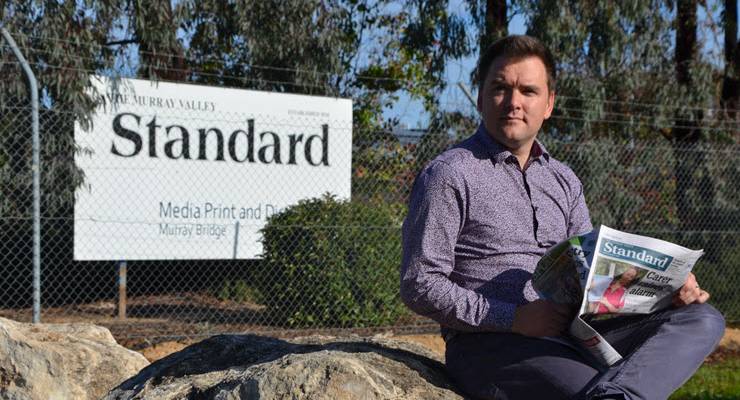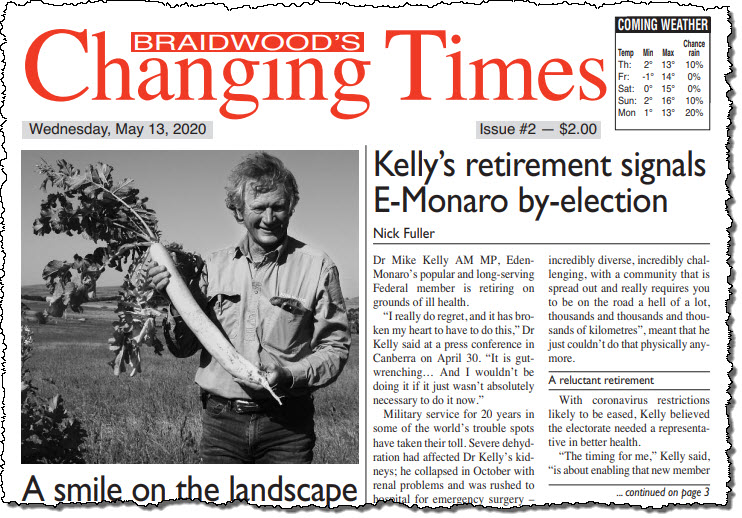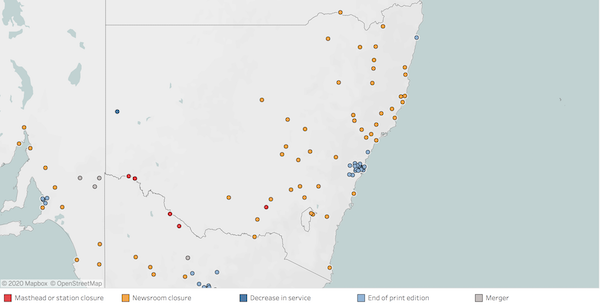
When the town of Braidwood, near Canberra, lost its local newspaper, some residents asked a very simple journalistic question: “How are we going to know who’s died?”
Obituaries, council notices and local sport — these had been essential in keeping the community informed and connected. Now they were gone.
The Braidwood Times is just one of about 152 community and regional newspapers around the country that have suspended printing due to the pandemic. After surviving the loss of classifieds and the move towards Facebook and Google, they now face their biggest challenge yet in COVID-19.
“We’re extremely concerned about these closures,” the chair of Australian Competition and Consumer Commission (ACCC), Rod Sims, told Crikey.
“You want to have proper reporting of local council meetings, local court matters, local business dealings so that someone is watching, corruption can be exposed, and the community is better informed.”
As printing presses fall silent across the country, the vital role local newspapers play in regional and suburban communities — and democracy — is becoming clear.
An ACCC report sounded the alarm on these publications last year, saying they were more at risk of failing due to their heavy reliance on local business advertising, already in steep decline.
The report revealed there were 21 local government areas that had no coverage from a local newspaper — and that was before COVID-19 triggered widespread closures or print suspensions by the two biggest regional news owners: News Corp, and Antony Catalano’s Australian Community Media (ACM) network.
Last month News Corp suspended print editions of 60 community and regional newspapers. Those papers may never return, after Catalano backed out of a deal to buy them. ACM has suspended print editions of nearly 100 of its regional mastheads.
Sims was worried that more newsrooms would follow: “Obviously the announcement by News Corp in relation to their [suburban] publications is just further evidence that these publications are under pressure and that’s a real threat to democracy in general.”
The picture emerging is grim. A map of closures by the Public Interest Journalism Initiative (PIJI) shows newsrooms have shut down in almost every state, with “news deserts” emerging in the Hunter Valley and parts of South Australia.
“We see this as an absolute crisis,” the journalism academic and PIJI board member, Margaret Simons, said. “It’s not the kind of crisis where you see the effects straight away. But the impact on the nation to be democratically healthy and governable are huge.”
177 years of history
Many more towns like Braidwood are feeling the effects.
The Maitland Mercury has served the Hunter Valley town of Maitland since 1843, making it the oldest regional paper in NSW. Last month ACM suspended the paper’s print run, and locals fear it’ll never return.
Loretta Baker, who’s lived in the town for 30 years and became its first female mayor in 2017, says the town lost far more than just a newspaper: “They’ve chronicled every flood, every drought, every natural disaster, our whole history.”
As a regional newspaper servicing a town of 78,000, the Mercury could tell the kinds of intimate, personal stories that would never get heard in a national news cycle fixated on coronavirus or the latest rumblings in Canberra.
“But more importantly, the things that won’t survive on Facebook are the highs and lows of individuals and their families,” Baker said. “So I guess the Mercury carries our history, but also, on a daily basis, it also carries stories about our people and our personalities.”
The crisis is also being felt in every state. Bruce Ellen, the general manager of Latrobe Valley Express and Gippsland Times in Gippsland, Victoria said the journalism the paper does is vital because “nobody else cares about it”.
“News Corp doesn’t care about it. Nine doesn’t care about it. Commercial radio gives lip service to it. They just don’t cover local news,” he said.
In South Australia, Peri Strathearn, who has set up his own news site after being stood down from the Murray Valley Standard, said the suspension of the paper has left readers in the dark when it comes to local issues.
“It would be such a loss to Murray Bridge and the Murraylands if there is no local voice reporting on what’s happening,” he said.
Kristy Hess, leader of research into local and community media at Deakin University, says the closure of newsrooms was a huge risk to a healthy democracy. “We’ve seen the rise of news deserts in the US, Canada and UK, where there is no designated news source,” she said. “We need to be very watchful of what’s happening in the Australian context.”
Not only was democracy impacted, but so too was social cohesion. In fire-effected towns, this is felt acutely.
“I don’t think it occurred to anyone that suddenly we might not have a local paper,” veteran Braidwood journalist Robin Tennant-Wood said. “We’ve gone through such a hard time and we’ve pulled through because we’ve stuck together.”
Tennant-Wood has stepped in to fill the void in Braidwood, publishing her own newspaper Braidwood’s Changing Times at her own expense. But other towns aren’t so lucky. Eden, which is recovering from bushfires and battling rising unemployment, has lost the Eden Magnet — another suspended ACM title.

“Eden is hanging by a thread, economically. The town needs more of a voice, not less,” Bega Valley Shire councillor Jo Dodds said.
‘A backwards step’
The permanent closure of the Parkes Champion Post, another 100-year-old ACM title which has been suspended due to COVID-19, would be an ‘unmitigated disaster’ for Parkes, Mayor Ken Keith says.
“Not having a local paper to me is almost an indication that a community is dying,” he said. “It’s a backwards step.”
Keith said the Champion Post was not just an important source of local news, it was one of the main ways the council communicated with the community on issues like town planning and development.
“Now people have had to go online to get information. But not everyone can do that,” he said.
It’s a concern shared by Maitland’s Loretta Baker. The Mercury, which published a print paper three times a week, will still be operating online, albeit in a more limited capacity during the stand-down, which ACM says will end in June.
For many locals, particularly older readers less comfortable with online news, getting the Mercury was a kind of lifelong ritual.
“The elderly always had the Mercury, and they always did the morning walk to pick it up,” she said. “They had a chat to someone in the newsagent, there was a social connection along the way. They’ve been doing that for so long, it’s part of their life that’s now gone.”
Baker says that without a physical paper so much of the town’s social fabric would be lost.
Nobody would report on the council or local government issues. Local charities and sporting events would have to look elsewhere for sponsorship. People who’d suffered accidents or injuries won’t be able to look to the Mercury for support.
“They celebrated a lot of our great things, the opening of our art gallery, the rebuilding of the levee, they celebrated our wins,” said Baker.
Part two tomorrow: who will fill the gap in regional news?










It is one of the ironies of modern life that 150yrs ago, with even fewer people living beyond the Sandstone Curtain, that the regions then supported local newspapers, railways, local commerce, travelling cinemas and theatre troupes.
Today the duopoly of the supamarts, the syndication of their press & radio stations – the “rationalisation” when bought out by big city money – has the made the erstwhile thriving villages and small towns into echoing ghost towns of shuttered shops and empty streets.
Can anyone say decentralisation?
Not by subsidy but by fully pricing the cost of the megacites on the coasts.
Glad you mentioned suburbs as well. We can get an online hard-to-read apology for a local newspaper in the eastern suburbs of Melbourne, owned, I think, by Newscorp and covering such a wide area as to be fairly useless. So in reality we get no local news apart from the local council information bulletin every month or so.
Recently a grand old Victorian house was knocked down for high rise units with no-one knowing how or why this was allowed. If we still had a local newspaper we would have known about it and perhaps could have objected or at least considered whether it was worth keeping.
And we get no other local news which is not good. Local papers help create a sense of community.
How do we bring them back?
Does a trusted local news source have to be printed on paper? Surely a dynamic local news website, attracting local advertising, would be just as effective and less costly to run.
When the ACCC succeeds in grabbing some cash back off Google and Facebook, maybe a fund could be set up to help underwrite the running costs of such local news sites?
Even more daringly, maybe the federal government could commit to supporting a local news site for every local government area in the country (including urban ones) – either by underwriting costs, or establishing its own not-for-profit outlets in areas where no private or community operator steps up.
Changed times need changed approaches.
Agree it can be online. Ours is just – what do you call it? – a screen dump of the printed version which is very slippery to scroll through and read. And not very local.
You’re missing the point of the ACCC “journalism” charge to Google and Facebook: the point is to entrench Newscorp and the other majors and lock-out the minor players. At least one of the smaller specialist Australian sites that I follow can see that coming. It’s happened or happening in Europe too.
It’s interesting that an article on regional news coverage is so dismissive of local commercial radio. The remark that commercial broadcasters pay lip service to local news is, of course, nonsense and merely reflects the siege mentality of the dying print industry.
Many regional radio networks- Grant Broadcasting, my employer, is a fine example – have invested heavily in news, not just through broadcast journlism but also via hyper-local talkback programs and extensive online news services. Radio’s interactive nature means stations are inevitably far more in tune with the local community than newspaper.
In most of the regions where newspapers have been shuttered, radio and its increasingly strong online extensions have stood strong, the only true local voice of the people, the medium that is and always has been the most responsive of all.
I’ve just looked on Wiki at your employer’s network and it certainly seems to have a wide spread through the regions.
Without knowing its editorial line (there has to be one) I wish it well of it truly serves locality.
… “IF it truly serves locality.“
I spent the last decade of my working life on a local publication – one started 15 years ago with the noble aim of “taking on Rupert.” At its inception, there were four other local papers – three run by News Corp and one other independent – all free and to varying degrees, delivered weekly to businesses and homes. The brave publisher figured there “was room for one more.” Well, it was 2005…
None now exist.
So they were the tumultuous final years of the local press (RIP). Now I don’t think anyone should get too starry-eyed nostalgic about the sort of local council and political coverage they served up… In our naivety in those early days, we thought that local politicians would respect “freedom of the press” and opinion. Our readers certainly did, they loved the irreverent honesty and scrutiny we we offered, but with rare exceptions, that was not the case from local councillors. It quickly became apparent that they, most mayors and other local politicians expected one thing and one thing only if they had an advertising budget at their disposal – and that was cheer squad-style coverage. This was particularly true of the Greens who at that time held sway over two of our local councils, and had one State MP (now two).
So we were frozen out, but most of the local coverage in those other four publications (including the News Corp ones, who totally ignored their supposed “anti-Greens” ideological role and delivered full-on gush) was little more than thinly disguised advertorial for anyone who purchased those full pages . And councils did so at full non-discounted rates too, they were brilliant clients to have… Needless to say, the political and council affairs stories were never labelled as “promotion” in the way, say, a feature on bathroom renovations alongside an ad for a plumbing supplier might be.
I know the situation is different in the regions (though I suspect not by much), but at least in case of the suburban locals, the notion “you’ll miss them when they’re gone” may be a bit inaccurate. Does anyone, really? Still, I really don’t know what the alternative is. Without those local papers – now there is nothing. Except Google and Facebook (sigh).
I remember a recent 2 page piece exclaiming how wonderful it was for everyone that house prices had shot up by more than 10%, making the chance of first home ownership even more remote for most .
There was no effort what so ever to point out this was basically an advertisement for their main funding source.
To their credit here are sometimes historic pieces and always local stories, sport, albeit filtered through a very starched pair of big whites.
As Jack T has said here, an independent site that sifts through mainstream media and other marketing/ advertising for that matter and calls out the facts , using critical thinking as a base. It could then be used as a reference base to support people struggling with mis information.
Of course this should be a governments/ ABC’s role but clearly it would then be at least in part compromised.
I would love to be able to support a difference of opinion within any discussion by referencing the specific topic with my phone.
A local app that was updated weekly could really be a community asset. It possibly would take community volunteers to spruik residents for funding..?
“To their credit here are”.. should have been .”there are” ..
Local school kids and other interested parties could be encouraged to participate ..with the same standard of considerate critical thinking edit as a footnote for each story. Even real estate agents funding could be accepted with this type of unbiased edit,.. An open forum could keep watch…wishful thinking..?
It’s not only Death Council notices that will be missed, but equally (more?) important will be the lack of an investigative journalist keeping a watchful eye to report on Council activities. Corruption has been known in small rural councils , particularly in land development and environmental decision making. Absence of a professional journalist ( no matter who pays their salary) leaves the burden of detection and protection to community members who may not have time or skills for the task.